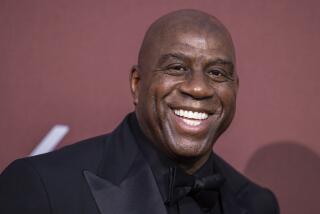TV’s Surprise Reality Show : RICK DU BROW : After Johnson, How Can TV Downplay AIDS?
- Share via
Magic Johnson may have slam-dunked television’s resistance to honest treatment of AIDS-related issues.
The barriers have already been broken to some degree in TV news and entertainment, but more often than not, the subject is treated gingerly, if at all.
But Johnson’s dignified announcement that he has tested positive for the virus that causes AIDS could well have more impact on TV than the producers and advocacy groups who have pushed for frankness in dealing with the disease and demanded more openness about the use of condoms.
TV coverage of the Laker star’s bombshell disclosure indicated the enormous national popularity he has achieved in more than a decade as a major American presence. In fact, with his television exposure, he has transcended sports itself and become a larger-than-life hero.
Thus, for the TV medium that made him a star to ignore the real message of his demeanor in his announcement Thursday would be criminal. His presentation--carried all over TV--virtually put the seal of approval on encouraging television to face up to the crisis of the ever-spreading virus.
TV has been much more receptive than films to AIDS stories, but it is still woefully deficient in presenting programs that educate the public.
Yet how can TV continue to have such an attitude after acknowledging the importance of the story with its extraordinary coverage of the Johnson news conference at the Forum and its aftermath of opinions from Laker physician Michael Mellman and other experts?
At one point, the conference was carried live by the seven largest TV stations in Los Angeles, plus such cable channels as CNN and ESPN.
The story then penetrated the nation in the most pervasive manner as it was carried, at length, at the top of the nightly network roundups anchored by Peter Jennings, Dan Rather and Tom Brokaw.
It is almost inconceivable that TV, after playing Johnson’s story so big, would put its head back in the sand when it comes to future programming.
How can the hypocrisy that buries condom ads on TV continue after Johnson warned repeatedly about safe sex and indicated that he would carry the message to young people as a spokesman about the virus?
And how can advertisers who are sensitive to subjects such as AIDS and the HIV virus ignore what now, more than ever, is out in the open?
Watching the reaction to Johnson’s disclosure in TV interviews--with ordinary people from around the nation--was a sure-fire alert to sponsors that stories about the virus and AIDS are acceptable and urgently necessary viewing.
Sponsors surely are aware that the distinguished ABC series “Life Goes On” drew its largest rating ever last Sunday when it launched a story line about a teen-ager who tests positive for the HIV virus.
And in a remarkable coincidence, only three days after Johnson’s announcement, many of California’s cable systems will unite from 6 to 9 p.m. Sunday for a previously scheduled “AIDS CableThon,” which now takes on an even more timely urgency.
Originating at Century Cable in Santa Monica, the telethon will reach more than 2 million homes throughout the state, with celebrities helping raise money to benefit organizations that support AIDS care and research.
TV’s pussyfooting on the AIDS crisis was indicated in the past when a PBS series that originated in 1988, “AIDS Quarterly,” was retitled “Health Quarterly” in 1990, even though it offered reports on the disease.
Johnson’s news conference, in which he retired as a player--but said he did not have AIDS--was the kind of personalized breakthrough about the virus that is particularly dramatized when it strikes celebrities. Actors Rock Hudson and Brad Davis died of AIDS.
But while Hudson’s belated disclosure of AIDS finally made the disease a household word, Johnson’s quick announcement about his HIV--and his use of TV to spread the word as widely as possible--was a monumental educational stroke because it showed a great sports hero, looking in robust health, saying that if it can happen to him, it can happen to anybody.
As perhaps the greatest celebrity in Hollywood and with the powerful agent Michael Ovitz as an adviser, Johnson, in his new role, conceivably could influence the creative output of some of the television and film powers he knows.
What’s more, Johnson will continue to be a constant presence on the Hollywood scene in his new task as an educator about the virus--unlike Hudson and Davis, who kept their affliction secret for a long time.
Hudson did not disclose his illness until shortly before he died in 1985, although friends said he discovered he had the disease the year before. Davis, the star of “Midnight Express,” who died in September, kept his infection secret for six years for fear of losing jobs. He left notes for a book charging that although Hollywood gives benefits and charity affairs for AIDS, actors do not get work if they are “even rumored to have HIV.”
But here now is Magic Johnson, an immense potential weapon against such Hollywood hypocrisy. And anyone who watched his remarkably poised, straightforward and truly heroic manner as he made his announcement on TV will never forget it. It was enough to make a viewer weep.
KNBC Channel 4’s Jess Marlow called it “the announcement that no one wanted to hear, no one wanted to believe.” Yet Johnson was breathtakingly impressive and gracious almost beyond belief, even singling out and naming reporters he would miss from his playing days.
In a TV interview, a shaken Mayor Tom Bradley told how he felt when he heard the news about Magic: “It was like someone hit me in the stomach with a 300-pound hammer.”
Exactly.
But if ever there was a TV role model who lived up to his billing, it was Magic Johnson on the day he had to quit. He gave a lesson in what style and class are all about.
More to Read
The complete guide to home viewing
Get Screen Gab for everything about the TV shows and streaming movies everyone’s talking about.
You may occasionally receive promotional content from the Los Angeles Times.






